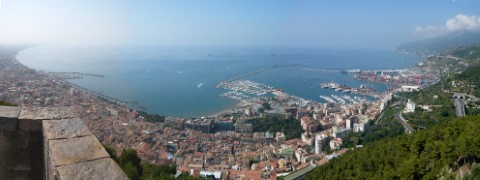Westminster Co-Awarded $250,000 NSF Grant for Student Travel and Research in Astronomy
Posted on Friday, August 26, 2016
 Dr. Thomas Oberst, Westminster College associate professor of physics, and Dr. Phillip Reed, Kutztown University associate professor of physics and astronomy, have been awarded a $250,000 collaborative grant from the National Science Foundation (NSF) for student travel and research in the field of astronomy.
Dr. Thomas Oberst, Westminster College associate professor of physics, and Dr. Phillip Reed, Kutztown University associate professor of physics and astronomy, have been awarded a $250,000 collaborative grant from the National Science Foundation (NSF) for student travel and research in the field of astronomy.
Between 2017 and 2020, 12 students from the two schools will visit universities in Italy, Australia and elsewhere to conduct paid internships with some of the world’s leading experts in exoplanetary science, the study of solar systems other than our own, to learn cutting-edge research techniques and to help discover and study planets.
Students entering or transferring to Westminster or Kutztown in 2016-2017 and 2017-2018 are eligible to apply, as are students currently enrolled at the two schools. “This is an incredible opportunity for students considering scientific- or engineering-related careers in astronomy or the aerospace industries,” Oberst and Reed said in a joint statement. “Even those who end up in other fields would benefit from the exposure to general research and data reduction techniques.”
Students majoring in science or engineering are often unable to study abroad due to heavier or more structured course loads during the school year and the need to earn incomes during the summer. The grant resolves both concerns by paying students to travel and conduct research overseas in the summer.
“International travel can be an educational and formative life experience in and of itself,” said Dr. Jeffrey Bersett, Westminster associate professor of Spanish and the travel coordinator for the grant.
In the first year, students will visit the University of Salerno on Italy’s famed Amalfi coast, where they will conduct research in gravitational microlensing, the brightening of a background object due to the bending of its light by the gravitational field of a foreground object, or “lens.” First published by Einstein in 1936, microlensing is a special case in which the lens is a star or planet, which has far weaker gravity than galaxies, the traditional lenses. Scientists at the university of Salerno have played a role in several important recent microlensing discoveries, including the detection of one of the first exomoon candidates.
In the second year of the grant, students will travel to the University of Southern Queensland, Australia, to study planets using the technique of Doppler spectroscopy. The third year destination is yet to be determined.
Westminster, Kutztown, Salerno and Southern Queensland are connected through the Kilodegree Extremely Little Telescope (KELT) project, an international network of nearly 50 observatories who collaborate to discover and study giant planets orbiting bright stars. KELT is headed by Lehigh University, the Ohio State University and Vanderbilt University. Oberst, Reed or their students have helped discover approximately 15 exoplanets in the past three years through their involvement in KELT.
The grant is part of the NSF’s International Research Experiences for Students (IRES) program, whose mission is to keep the U.S. at the forefront of science, technology, engineering and mathematics (STEM) by developing a globally-engaged workforce capable of performing in an international research environment.
Visit http://tiny.cc/NSF-IRES for more information or to apply to this NSF IRES program.
Contact Oberst at 724-946-7204 or email oberstte@westminster.edu for additional information.
More Stories



